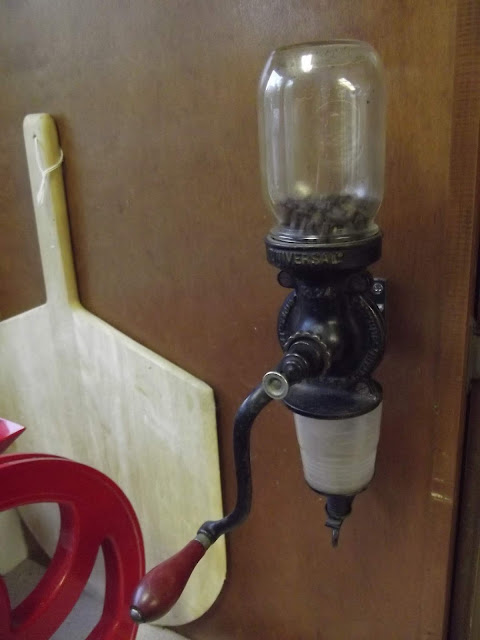A few years ago, when thinking of things we could do to reduce power usage, I decided to try to find a hand powered coffee grinder. (Yes, we are becoming coffee snobs, fresh ground, organic fair trade, the whole bit) Grinding coffee is in reality a small part of our electricity use, but sometimes, a change like this can be kind of fun, and keeps the idea of reduced electricity use in the forefront of our thinking.
There are plenty of modern designs on the market, but why not find a used one or an antique, and avoid consumption of new materials? When I began the search, we would stop in antique shops every once in a while while traveling, but many of these antique grinders were no longer functional, merely nostalgic decoration.
Finally found one that was in good working order, and have been using it for the last six years. This particular grinder is over 100 years old, and build of cast iron and very rugged gearing. The design is simple, and once the grind adjustment is set how you like it, no more worries. Grinds fine every time.
Our wall mounted Universal #24 coffee grinder.
This is but one example of designing for the long term, or, as I like to think of it, for the low energy future. There are very few household items built today that have long term durability and low or no electrical energy use as part of their design criteria.
The next possible question is, how can I justify buying coffee, which is an imported luxury? Happily I can afford it, but for now, I feel ok as buying fair trade coffee gives better support to farmers, and coffee is not a commodity that ships by air, so the shipping impact is (relatively) low. However, it is a luxury, and not local, so at some point I will experiment with chicory root as a substitute, and see if I can adjust to that, as chicory grows all over the place here in Wisconsin. I would miss the caffeine though.
What other small, incremental steps can we take to reduce consumption, reduce reliance on fossil fuels? There are dozens, and all it takes is some imagination and being more aware of our daily routines, and thinking about how we could modify them to be more simple and human powered. A bit of research on how things were done in the past also helps.
